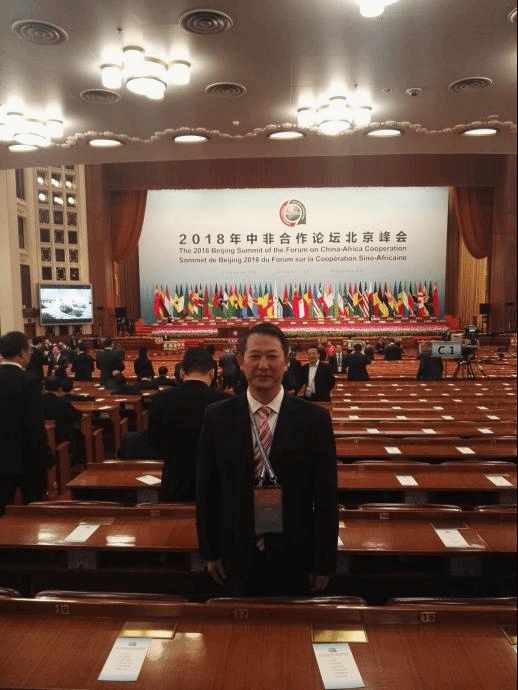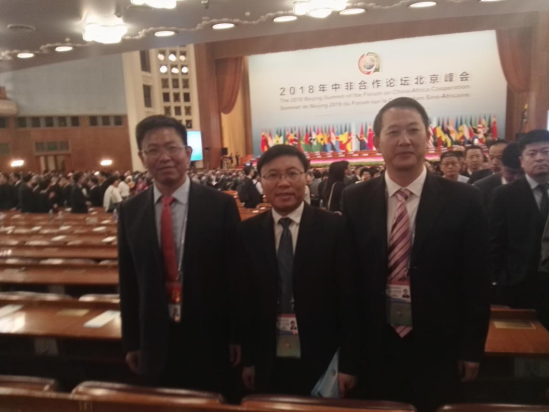On September 3rd, Liu Jisen, Executive President of IAS, GDUFS, as a representative of the think tank, attended the opening ceremony of 2018 Forum on China-Africa Cooperation (FOCAC) and listened to President Xi's speech at Great Hall of the People.

Prof. Liu at Great Hall of the People

Prof. Liu Jisen, Mr. Zheng Jianrong and Mr. Zhang Huarong
President Xi mentions that we should take our historical responsibility and respond to the call of our times with solidarity, vision, courage and a sense of mission.
To respond to the call of the times, China takes it its mission to make new and even greater contribution to mankind. China will work with other countries to build a community with a shared future for mankind, forge partnerships across the world, enhance friendship and cooperation, and explore a new path of growing state-to-state relations based on mutual respect, fairness, justice and win-win cooperation. Our goal is to make the world a place of peace and stability and life happier and more fulfilling for all.
To respond to the call of the times, China is ready to jointly promote the Belt and Road Initiative with international partners. We hope to create new drivers to power common development through this new platform of international cooperation; and we hope to turn it into a road of peace, prosperity, openness, green development and innovation and a road that brings together different civilizations.
To respond to the call of the times, China will get actively involved in global governance and stay committed to the vision of consultation, cooperation and benefit for all in global governance. China has all along played its part in promoting world peace and development and upholding the international order. We call for increasing the representation and voice of developing countries in international affairs and support efforts to strengthen the South, a weak link in the global governance system, as well as efforts to create synergy in South-South cooperation. We will continue the efforts to make the global governance system better represent the will and interests of the majority of countries, especially developing countries.
To respond to the call of the times, China will remain committed to opening-up. Facing uncertainty and unpredictability in global growth, China will continue to grow an open economy for win-win cooperation, and it will embrace an open world economy and the multilateral trading system and reject protectionism and unilateralism. No one who keeps himself in isolation on a single island will have a future.
During the Summit, China decided to launch eight major initiatives in close collaboration with African countries in the next three years and beyond. Some of these initiatives are already being implemented, and some of them are of reference significance for the China-Afghanistan cooperation.
These includes: Implementing of the industrial promotion plan, encouraging Chinese companies to increase investment in Africa, building and upgrading a number of economic and trade cooperation zones in Africa, carrying out agricultural assistance programs; Implementing infrastructure connectivity projects, opening more direct flights between China and Africa; Implementing trade facilitation activities, increasing imports from Africa, particularly non-resource products and setting up relevant mechanisms to promote e-commerce cooperation; Undertaking aiding projects on green development, and ecological and environmental protection in Africa, strengthening exchanges and cooperation with Africa on climate change, ocean, desertification prevention and control, and wildlife protection; Setting up Luban Workshops in Africa to provide vocational training for young Africans, carrying out tailored programs to train 1,000 high-caliber Africans; Upgrading medical and health aid programs for Africa, particularly flagshipprojects such as the headquarters of the African Center for Disease Control and Prevention and China-Africa Friendship Hospitals, training more medical specialists for Africa; Implementing people-to-people exchange programs, establishing China-Africa Joint Research and Exchange Center and China-Africa Media Cooperation Network; Setting up a China-Africa Peace and Security Fund, continuing to provide military aid to the Africa Union, launching security assistance programs to advance China-Africa cooperation in the fields of law and order, UN peacekeeping missions, fighting piracy and combating terrorism.
All of the above-mentioned eight major initiatives are the result of deep consultations and strategic coordination between China and Africa. They are based on African countries' conditions and urgent needs, and are within China's capacity. These initiatives are closely related to African people's livelihood, grassroots, youths, and high-techs, and will enhance common people's sense of security, sense of gain, sense of happiness. The initiatives worth studying for the Afghan friends, and use it for reference in promoting China-Afghanistan cooperation.

